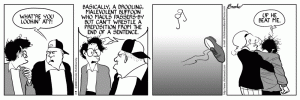My Dad was a writer. Without me fully realizing, he instilled my love of language and taught me the rules of writing (and when to break them) from a very young age. I wish he was here with me now to witness, and provide counsel to, my rebirth to the study of the craft. What I do have is my memories and his writing to guide me. I share these lessons with you.
My father was a very funny man. So let’s begin with a short joke he shared with me long ago that taught me the rules of a preposition in a way that’s hard to forget. I’ve shared this to ease many a college student who quivered at the thought of writing a paper (please, no!).
*******************
A young college freshman is lost on campus, looking for the library. He approaches what appears to be two upper-classmen to ask for directions.
“Hey, can you tell me where the library’s at?”
“Listen little fella, here at Harvard, we do not end a sentence with a preposition!”
“Oh, sorry. Can you tell me where the library’s at, — asshole?”
******************
This joke may be well known by now, but I’ll never forget my Dad’s rendition with his sly grin (because he was his best audience :)). And it always brings me a smile when I have to restructure a sentence that wants to end with a preposition.
Of course, the easiest way to solve the Harvard problem is to drop the proposition, altogether: Where is the library? If only life and writing were that simple.
But, wait! Let’s make it more complicated. Have the rules changed? Here is the alternate view on the use of the preposition in modern English, by Richard Lederer, Ph.D., former usage editor of the Random House Dictionary of the English Language and self-proclaimed, Grammar Guru.
Dr. Lederer’s argument makes sense when the sentence is so restructured to avoid the grammatical sin of ending with the preposition, that it becomes awkward — too far off from natural speech. He gives examples of famous poets who’ve committed the sin, purposefully. And what about a character’s dialogue in fiction; are we not preposition sinners with our everyday speech?
Yes, times change and language evolves, but I am not willing to jump off the Strunck and White ship, at least not completely. There are times to bend the rules of grammar, even for the aging position of the preposition. I am sure of one rule: always consider the audience—including publishers—first. I’m sure Dad would agree.
Additional resources:
List of one-word prepositions; also download free list for more.
Tip Sheet: Words that require a preposition; lists the words with correct usage.
What about fiction?
Edward Allen Publishing on the terminal preposition rule.
On Fiction Writing – few good tips and examples.
And, just for fun! 🙂 🙂 🙂



My grandfather used to say, when I asked him where something was at, “right before the at.” 🙂
Ha, I love it!
My father was funny too–one of his favorite things to say to us when we disagreed with him was , “Don’t be an asshole.” So I laughed at the joke and the momory of my father.
Oh, Dads. *sigh* I’m glad I could give a smile thinking of him. Those four words really do sum up the philosophy of life!
That’s why everyone needs a dad or at least a dad figure in their lives. 🙂
Agree 🙂
I do’t know what a preposition is. Silly I know. When my classmates were learning grammar I was in an advanced class reading. My teacher thought I knew it all because I spoke correctly. I learned by listening. Now if it sounds right then I think it is right, I’m afraid if I look up the ruled now I will just confuse myself!
I actually just read an article about a study that showed the best way we learn grammar is through speech and reading! I don’t really think about it either, unless something just doesn’t seem right.
As for what a prepositions is — that’s why I put the little video in there. It’s made for kids, but I can always use a reminder, too! And I didn’t even mention the “prepositional PHRASE”! That one always confused me 🙂
note: i bookmarked the link ;D
LOL..i had to read it twice, to get the joke. ow, nice sharing for preposition. I’ll learn more about it. i think i’ve committed so much sin in this grammar world…owchhh.
Listen, you’re doing just fine with writing in another language. I couldn’t do that!!!
But, I hope this helps you, if you want it. Start with the video – it gives a pretty simple explanation using preposition words. In the simplest term, they’re just “helper” words that show the direction of other words: Climb “up” the ladder; Cat is “in” the tree, The library “at” Harvard. (lol)
Owch, thank you for the nice words.
Noted the suggestion, for me it looks like kill two birds with one stone, learning about preposition and English listening. 🙂
Thank you, enjoy writing slowly, slowly but sure good impact 🙂